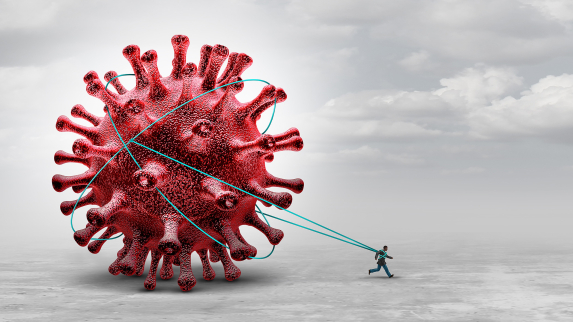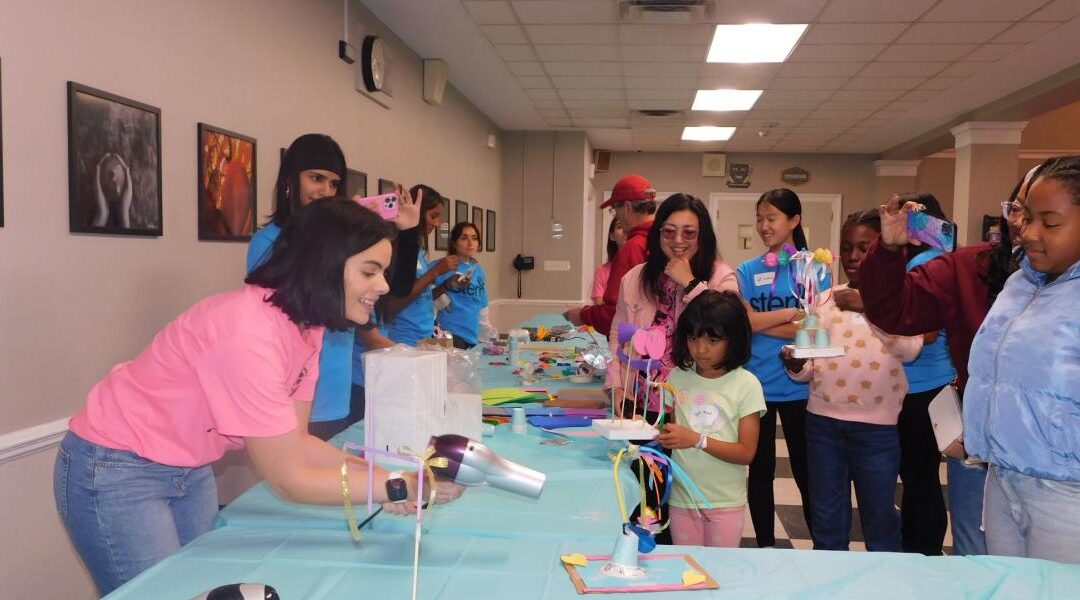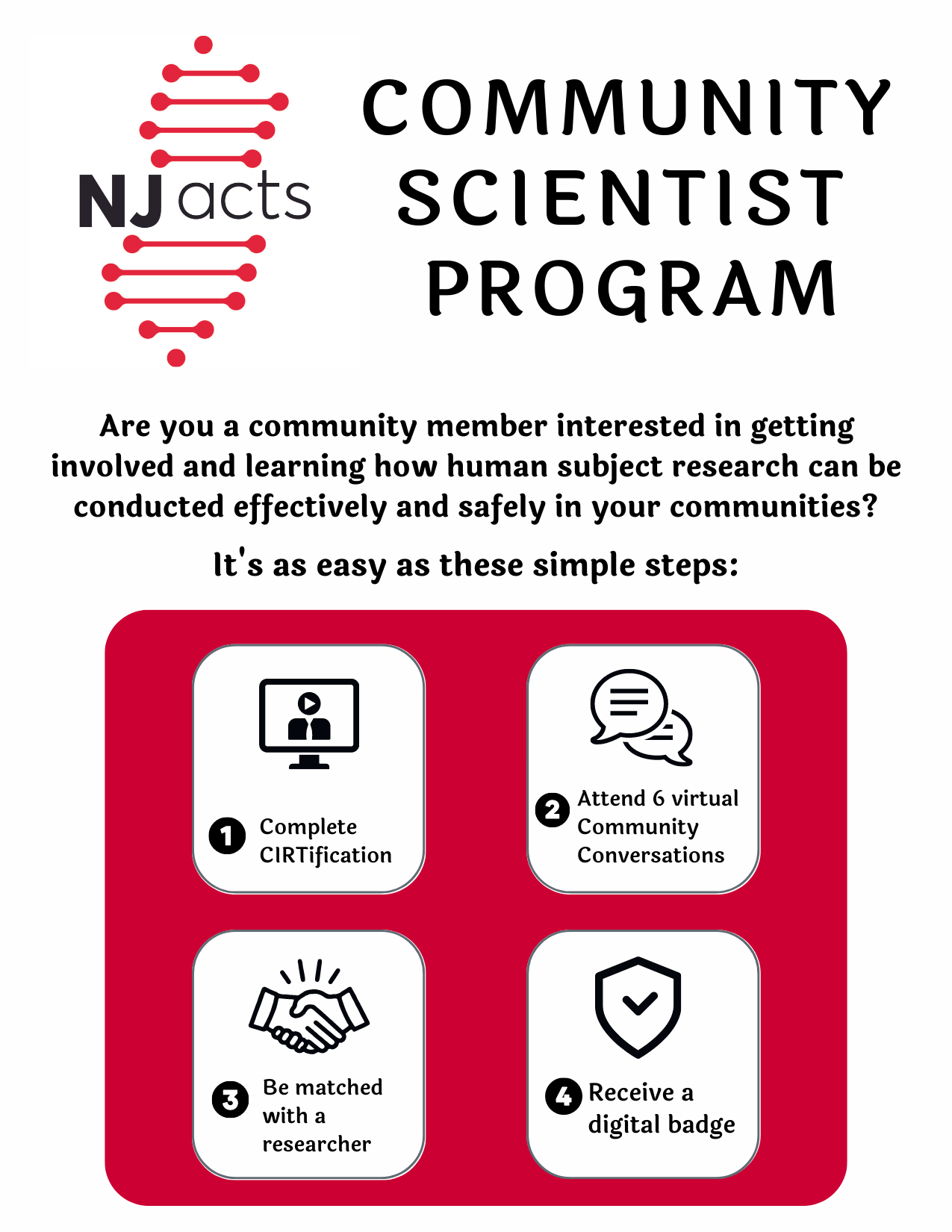180+ networks across 21 NJ counties
COMMUNITY ENGAGEMENT CORE OVERVIEW
NJACTS draws leading academic, industry and community groups together to understand and address the health needs of New Jersey. Central to this is engagement with our community to ensure that our efforts respond to their priorities. Our goal is to conduct research with the New Jersey community, in the community and for the community, and yet, have impact beyond our state’s boundaries.
Stay in Touch!
Join RCommunity!
Join Rutgers Health Service Corps!
Empowering Community-Based Research
Through Cultural and Linguistic Collaboration
- Navigating interpreter-mediated encounters
- Effective translation for research
- Understanding cultural nuances in literacy, trust, and belonging
Through collaboration across disciplines and leveraging expertise within and beyond Rutgers, CrEER ensures that research is inclusive, culturally relevant, and impactful both locally and globally.
👉 Discover how CrEER is shaping the future of community-based research here.
Association for Clinical and Translational Science (ATCS) Membership for Community Members
Did you know that community members are eligible to become members of ACTS through their affiliation with NJ ACTS?
Community members are able to access ACTS’ member benefits, including:
- Discounted registration to the annual Translational Science meeting
- Opportunities to participate in Special Interest Groups and Committees
- Access to the community platform website and more!
Resource for Investigators – CTSA Compendium of D&I Catalogs
Dissemination and implementation (D&I) research focuses on translating evidence-based interventions into real-world settings to improve health outcomes in the broader community.
An open-source CTSA Compendium of D&I Catalogs has been developed by the Clinical & Translational Science Awards (CTSA) Program’s “Advancing Dissemination and Implementation Sciences in CTSAs” working group to support investigators at any stage of their D&I skill-building journey. It provides a curated list of resource catalogs relevant to the conduct of D&I science. The materials include frameworks/theories/models, methods/measures, funding resources, practice resources, training, and health equity resources. Click here to learn more.
CIRTification – A New Alternative to CITI for Community Partners
The rollout of CIRTification at Rutgers has begun. The CIRTification program provides research ethics training alternatives for individuals in community organizations, with limited understanding of conducting human research and protecting potential research participants. This option provides training focused on equipping community partners to conduct human subject research effectively and safely in their communities.
To learn more about the program at Rutgers, please visit this link CIRTification.
NJ ACTS COMMUNITY SCIENTIST PROGRAM
This program is designed to provide researchers with rapid feedback from expert community members to ensure their research projects are culturally appropriate and relevant to the community.
PARTICIPATE IN OUR NEXT COHORT!
For more information, please contact njactscommunity@rwjms.rutgers.edu
NJ HEROES TOO
Through the ongoing New Jersey Healthcare Essential Worker Outreach and Education Study – Testing Overlooked Occupations (NJ HEROES TOO), we have gained a wealth of data on COVID-19’s effects, gleaned valuable learnings on attitudes toward testing and vaccines, and improved COVID-19 awareness in underserved communities.

Community Blog
NJACTS Community Engagement Core COVID-19 Resources
The situation around the current spread of COVID-19 is changing rapidly. We have compiled resource links for the general community highlighting local resources across New Jersey, ways to get involved, and mental and physical wellness. Visit our COVID-19 page for...
N.J. Gov. Phil Murphy urges microplastics regulations in tap water. Can water providers meet the challenge?
New Jersey Gov. Phil Murphy this week led a petition that was sent to the U.S. Environmental Protection Agency, urging for nationwide monitoring of microplastics in public drinking water. The tiny particles come from a variety of plastic products and can contaminate...

Could Hidden Infections Be Fueling Long COVID?
For millions suffering from long COVID, their persistent breathlessness, brain fog and fatigue remain a maddening mystery, but a group of leading microbiologists think they may have cracked the case. The culprit for some long COVID cases, they suggest, might be other...

How NJIT Graduate Student Jaimee Diogo Is Transforming STEM Futures Through ‘STEM Like a Girl’
The kinetic sculptures were supposed to spin gently when the girls turned on their hair dryers. But as soon as the first creation twirled into motion — foil shimmering, ribbons fluttering — the whole room lit up. A crowd of elementary-aged girls leaned in, laughing as...

New Study Reveals Progress in Hospital Maternity Care Access in New Jersey, with Opportunities for Continued Improvement.
The availability of maternity care services varies considerably throughout New Jersey hospitals with those having the fewest services are more likely to serve Hispanic patients, while those with the most services serve a larger proportion of White patients, according...
Submit Your Proposal for Clinical Trials Days 2026
CLINICAL TRIALS DAY 2026: Advancing Health Through Research May 20, 2026 Call for Proposals (Proposal Deadline February 13th) Showcase Your Research. Share Your Innovation. Advance Health Through Clinical Science. Clinical Trials Day celebrates the essential...


